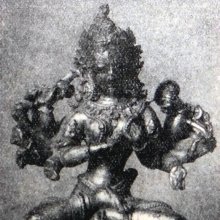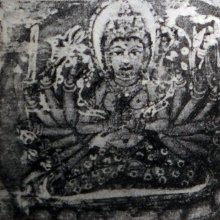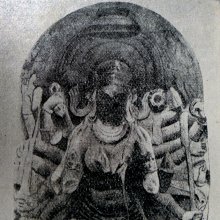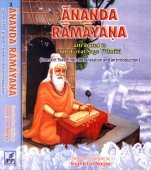Sumati, Sumatī: 26 definitions
Introduction:
Sumati means something in Buddhism, Pali, Hinduism, Sanskrit, Jainism, Prakrit, Hindi. If you want to know the exact meaning, history, etymology or English translation of this term then check out the descriptions on this page. Add your comment or reference to a book if you want to contribute to this summary article.
Images (photo gallery)
In Hinduism
Purana and Itihasa (epic history)
Source: Wisdom Library: Bhagavata Purana1) Sumati (सुमति):—Son of Nṛga (son of Vaivasvata Manu). He had a son named Bhūtajyoti. (see Bhāgavata Purāṇa 9.2)
2) Sumati (सुमति):—One of the two wifes of Sagara (son of Bāhuka). (see Bhāgavata Purāṇa 9.8.8)
3) Sumati (सुमति):—One of the three sons of Rantināva (son of Ṛteyu). He had a son named Rebhi. (see Bhāgavata Purāṇa 9.20.6-7)
4) Sumati (सुमति):—Son of Supārśva (son of Dṛḍhanemi). He had a son called Sannatimān. (see Bhāgavata Purāṇa 9.21.28-29)
Source: Wisdom Library: Varāha-purāṇa1) Sumati (सुमति).—The son of Bharata, who was the son of Ṛṣabha, according to the Varāhapurāṇa chapter 74. Ṛṣabha was the son of Nābhi, whose ancestral lineage can be traced to Svāyambhuva Manu, who was created by Brahmā, who was in turn created by Nārāyaṇa, the unknowable all-pervasive primordial being. Sumati inherited the kingdom Bhārata (which lies south of Hemādri) from Bharata when he retired to the forest. Sumati had a son named Tejas.
2) Sumati (सुमति).—One of the eight principal ministers of Mahiṣāsura, an asura chieftain from the city Mahiṣa, according to the Varāhapurāṇa chapter 93. All of these ministers were learned, valiant and just.
The Varāhapurāṇa is categorised as a Mahāpurāṇa, and was originally composed of 24,000 metrical verses, possibly originating from before the 10th century. It is composed of two parts and Sūta is the main narrator.
Source: archive.org: Puranic Encyclopedia1) Sumati (सुमति).—A Rākṣasa who lives in Varuṇa’s court worshipping him. (Sabhā Parva, Chapter 9, Verse 13).
2) Sumati (सुमति).—A great maharṣi who was one of the munis who visited Bhīṣma on his bed of arrows. (Anuśāsana Parva, Chapter 26, Verse 4).
3) Sumati (सुमति).—A sister of Garuḍa and wife of King Sagara. (See under Sagara).
4) Sumati (सुमति).—A king, son of Kākutstha of solar dynasty. (Vālmīki Rāmāyaṇa, Bālakāṇḍa, Canto 47, Verse 7).
5) Sumati (सुमति).—A King, grandson of Ṛṣabha and son of Bharata. (Viṣṇu Purāṇa, Part II, Chapter 1). He was a righteous ruler. After ruling the country well for long and performing many yajñas his father Bharata crowned Sumati king and practising meditation in Sālagrāma temple he gave up his life. (See under Bharata III).
6) Sumati (सुमति).—A king, son of Dyumatsena and father of Subala. (Bhāgavata, Skandha 9).
Source: Cologne Digital Sanskrit Dictionaries: The Purana Index1a) Sumati (सुमति).—A son of Bharata, whom he succeeded. Elevated as a deity by Pākhaṇḍas as he followed the path of Ṛṣabha. His queen was Vṛddhasenā and son Devatājit. Father of Devadyumna through Āsuri;1 father of Tejas(a).2
- 1) Bhāgavata-purāṇa V. 7. 3; 15. 1-3; Vāyu-purāṇa 33. 53.
- 2) Brahmāṇḍa-purāṇa II. 14. 62; Viṣṇu-purāṇa II. 1. 33, 36.
1b) A son of Nṛga and father of Bhūtajyotis.*
- * Bhāgavata-purāṇa IX. 2. 17.
1c) A son of Somadatta and father of Janamejaya; was invited for the Rājasūya of Yudhiṣṭhira.*
- * Bhāgavata-purāṇa IX. 2. 36; X. 74. 8.
1d) A son of Rantibhāra, and father of Raibhya.*
- * Bhāgavata-purāṇa IX. 20. 6 & 7.
1e) The son of Supārśva, and father of Sannatimān.*
- * Bhāgavata-purāṇa IX. 21. 28; Matsya-purāṇa 49. 74; Vāyu-purāṇa 99. 188; Viṣṇu-purāṇa IV. 19. 49.
1f) A son of Dyumatsena (Dhṛḍasena) and father of Subala.*
- * Bhāgavata-purāṇa IX. 22. 48.
1g) A Carakādhvaryu.*
- * Brahmāṇḍa-purāṇa II. 33. 12; 35-63.
1h) (Atreya)—the wise sage.*
- * Brahmāṇḍa-purāṇa II. 35. 63.
1i) A son of Uttama Manu.*
- * Brahmāṇḍa-purāṇa II. 36. 40.
1j) One of the twenty Amitābha gods.*
- * Brahmāṇḍa-purāṇa II. 36. 53; IV. 1. 17; Vāyu-purāṇa 100. 16.
1k) A god of Ābhūtaraya group.*
- * Brahmāṇḍa-purāṇa II. 36. 55.
1l) A son of Haryaśva and Dṛṣadvatī.*
- * Brahmāṇḍa-purāṇa III. 63. 75.
1m) A daughter of Ariṣṭanemi (of Kaśyapa, vāyu-purāṇa.) and sister of Suparṇa (Garuḍa, Vāyu-purāṇa);1 queen of Sagara s.v., and mother of 60000 sons born by the grace of Aurva and known as Sāgaras: out of long gourd; each of them entrusted to a nurse; became developed in nine months and in course of time attained youth.2
- 1) Brahmāṇḍa-purāṇa III. 63. 159.
- 2) Bhāgavata-purāṇa IX. 8. 9 and 11; Brahmāṇḍa-purāṇa III. 49. 59; 51 28 and 39: 52. Vāyu-purāṇa 88. 159-164; Viṣṇu-purāṇa IV. 4. 1-4.
1n) A Bṛhadratha; for 33 years.*
- * Brahmāṇḍa-purāṇa III. 74. 119; Vāyu-purāṇa 99. 305.
1o) A son of Sāvarṇi Manu.*
- * Matsya-purāṇa 9. 33; Vāyu-purāṇa 100. 22.
1p) An Asura in the Sabhā of Hiraṇyakaśipu.*
- * Matsya-purāṇa 161. 79.
1q) A pupil of Sūta, Romaharṣaṇa.*
- * Vāyu-purāṇa 61. 55; 62. 46 and 48; Viṣṇu-purāṇa III. 6. 17.
1r) A son of Janamejaya; with him ends the Vaiśāla line.*
- * Viṣṇu-purāṇa IV. 1. 58-9.
1s) A son of Antināra.*
- * Viṣṇu-purāṇa IV. 19. 4.
Sumati (सुमति) is a name mentioned in the Mahābhārata (cf. II.9.13) and represents one of the many proper names used for people and places. Note: The Mahābhārata (mentioning Sumati) is a Sanskrit epic poem consisting of 100,000 ślokas (metrical verses) and is over 2000 years old.

The Purana (पुराण, purāṇas) refers to Sanskrit literature preserving ancient India’s vast cultural history, including historical legends, religious ceremonies, various arts and sciences. The eighteen mahapuranas total over 400,000 shlokas (metrical couplets) and date to at least several centuries BCE.
Natyashastra (theatrics and dramaturgy)
Source: Wisdom Library: SaṅgītaśiromaṇiSumatī (सुमती, “devotional”) refers to one of the sixteen words that together make up the elā musical composition (prabandha), according to the Saṅgītaśiromaṇi 67-84. Elā is an important subgenre of song and was regarded as an auspicious and important prabandha (composition) in ancient Indian music (gāndharva). According to nirukta analysis, the etymological meaning of elā can be explained as follows: a represents Viṣṇu, i represents Kāmadeva, la represents Lakṣmī.
Sumatī is one of the sixteen words of elā and has a presiding deity named medinī (the earth) defined in the Saṅgītaśiromaṇi (“crest-jewel of music”), which is a 15th-century Sanskrit work on Indian musicology (gāndharvaśāstra).

Natyashastra (नाट्यशास्त्र, nāṭyaśāstra) refers to both the ancient Indian tradition (shastra) of performing arts, (natya—theatrics, drama, dance, music), as well as the name of a Sanskrit work dealing with these subjects. It also teaches the rules for composing Dramatic plays (nataka), construction and performance of Theater, and Poetic works (kavya).
Chandas (prosody, study of Sanskrit metres)
Source: Shodhganga: a concise history of Sanskrit Chanda literatureSumatī (सुमती) is the alternative name of a Sanskrit metre (chandas) mentioned by Hemacandra (1088-1173 C.E.) in his auto-commentary on the second chapter of the Chandonuśāsana. Sumatī corresponds to Bhramarī (according to Bharata). Hemacandra gives these alternative names for the metres by other authorities (like Bharata), even though the number of gaṇas or letters do not differ.

Chandas (छन्दस्) refers to Sanskrit prosody and represents one of the six Vedangas (auxiliary disciplines belonging to the study of the Vedas). The science of prosody (chandas-shastra) focusses on the study of the poetic meters such as the commonly known twenty-six metres mentioned by Pingalas.
Kavya (poetry)
Source: Wisdom Library: Kathāsaritsāgara1) Sumati (सुमति) is the name of a minister (mantrin) of king Ugrabhaṭa from Rāḍhā, according to the Kathāsaritsāgara, chapter 74. Accordingly, as a Brāhman said to Bhīmabhaṭa: “... your mother the queen Manoramā, and the chaplain Yajuḥsvāmin, and Sumati, the minister of your father, send you the following advice at this juncture;...”.
2) Sumati (सुमति) is the minister (mantrin) of Mahendrāditya, a world-conquering king (jagajjayin) from Avanti, according to the Kathāsaritsāgara, chapter 120. Accordingly, as sage Kaṇva narrated to Naravāhanadatta: “... and that king [Mahendrāditya] had a great minister named Sumati, and a warder named Vajrāyudha, in whose family the office was hereditary. With these the king remained ruling his realm, propitiating Śiva, and ever bearing various vows in order to obtain a son”.
The Kathāsaritsāgara (‘ocean of streams of story’), mentioning Sumati, is a famous Sanskrit epic story revolving around prince Naravāhanadatta and his quest to become the emperor of the vidyādharas (celestial beings). The work is said to have been an adaptation of Guṇāḍhya’s Bṛhatkathā consisting of 100,000 verses, which in turn is part of a larger work containing 700,000 verses.

Kavya (काव्य, kavya) refers to Sanskrit poetry, a popular ancient Indian tradition of literature. There have been many Sanskrit poets over the ages, hailing from ancient India and beyond. This topic includes mahakavya, or ‘epic poetry’ and natya, or ‘dramatic poetry’.
General definition (in Hinduism)
Source: WikiPedia: HinduismSumatī (सुमती): Wife of Sagara.
In Buddhism
Mahayana (major branch of Buddhism)
Source: Wisdom Library: Maha Prajnaparamita SastraSumati (सुमति) is the name of a Bodhisattva, according to the Mahāprajñāpāramitāśāstra chapter XLVI.—Accordingly, “thus the Bodhisattva Siu-mo-t’i (Sumati), in the Ts’in language “Good Intellect”, seeing the Buddha Jan-teng (Dīpaṃkara) and having nothing to offer him, set out to look everywhere. Seeing a seller of flowers, he bought five blue lotus flowers (nīlotpala) for five hundred gold pieces (kārṣāpaṇa) and offered him the flowers”. Such Bodhisattvas who would meet a Buddha and would wish to honor him were very upset if they did not have any offerings.

Mahayana (महायान, mahāyāna) is a major branch of Buddhism focusing on the path of a Bodhisattva (spiritual aspirants/ enlightened beings). Extant literature is vast and primarely composed in the Sanskrit language. There are many sūtras of which some of the earliest are the various Prajñāpāramitā sūtras.
Tibetan Buddhism (Vajrayana or tantric Buddhism)
Source: Wisdom Library: Tibetan Buddhism1) Sumatī (सुमती) is the name of a Yakṣiṇī mentioned as attending the teachings in the 6th century Mañjuśrīmūlakalpa: one of the largest Kriyā Tantras devoted to Mañjuśrī (the Bodhisattva of wisdom) representing an encyclopedia of knowledge primarily concerned with ritualistic elements in Buddhism. The teachings in this text originate from Mañjuśrī and were taught to and by Buddha Śākyamuni in the presence of a large audience (including Sumatī).
Source: archive.org: The Indian Buddhist IconographySumati (सुमति) refers to one of the twelve Dhāriṇīs according to the 11th-century Niṣpannayogāvalī of Mahāpaṇḍita Abhayākara.—Dhāriṇī is a peculiar kind of Buddhist literature which is supposed to generate great mystic power if repeated continually for a long time. They are short works mostly composed of meaningless syllables, sometimes revealing traces of a language now defunct. [...] The deification of books is not unknown in Buddhism. [...] The Niṣpannayogavālī acknowledges altogether twelve Dhāriṇī (viz., Sumati) deities and gives their descriptions. These Dhāriṇīs look alike when represented and they are usually two-armed, holding the Viśvavajra in the right hand and their special symbols in the left.
Sumatī is described in the Niṣpannayogāvalī (dharmadhātuvāgīśvara-maṇḍala) as follows:—
“Sumatī is yellow in colour and holds in her left hand the ears of corn”.
[Her Colour is yellow; her Symbol is ears of corn; she has two arms.—When conceived in the form of deities, the Dhāriṇīs (viz., Sumatī) are endowed with one face and two arms. They all hold in their right hand the double thunderbolt or the viśvavajra, while in the left they carry their own special symbols.]

Tibetan Buddhism includes schools such as Nyingma, Kadampa, Kagyu and Gelug. Their primary canon of literature is divided in two broad categories: The Kangyur, which consists of Buddha’s words, and the Tengyur, which includes commentaries from various sources. Esotericism and tantra techniques (vajrayāna) are collected indepently.
In Jainism
General definition (in Jainism)
Source: Wisdom Library: Jainism1) Sumati (सुमति):—The fifth Tīrthaṅkara (Janism recognizes 24 such teachers or Siddhas). He is also known as Sumatinātha. His colour is gold (kāñcana), according to Aparājitapṛcchā (221.5-7). His height is 300 dhanuṣa (a single dhanuṣa (or, ‘bow’) equals 6 ft), thus, roughly corresponding to 549 meters. His emblem, or symbol, is a Goos.
Sumati’s father is Megha according to Śvetāmbara but Meghaprabha according to Digambara and his mother is Maṅgalā. It is an ancient Jain practice to worship the Tīrthaṅkara’s parents in various rites, such as the pratiṣṭhāvidhi, according to the Ācāradinakara (14th century work on Jain conduct written by Vardhamāna Sūri).
2) Sumati (सुमति) is the name of a kulakara (law-giver) according to the Jambūdvīpaprajñapti (a Śvetāmbara text).
Sumati is also listed as the wife of Vimalavāhana (another kulakara) according to Digambara sources, while Śvetāmbara names his wife as Sumati.
The kulakaras (similair to the manus of the Brahmanical tradition) figure as important characters protecting and guiding humanity towards prosperity during ancient times of distress, whenever the kalpavṛkṣa (wishing tree) failed to provide the proper service. These law-givers and their wifes (e.g., Sumati) are listed in various Jain sources, such as the Bhagavatīsūtra and Jambūdvīpaprajñapti in Śvetāmbara, or the Tiloyapaṇṇatti and Ādipurāṇa in the Digambara tradition.
Source: archive.org: Trisastisalakapurusacaritra1) Sumati (सुमति) or Sumatinātha refers to the fifth of the twenty-four Tīrthaṅkaras praised in the first book (ādīśvara-caritra) [chapter 1] of Hemacandra’s 11th century Triṣaṣṭiśalākāpuruṣacaritra: an ancient Sanskrit epic poem narrating the history and legends of sixty-three illustrious persons in Jainism.
Accordingly, “[...] we worship the Arhats, who at all times and all places purify the people of the three worlds by their name, representation, substance, and actual existence. [...] May the Blessed Sumati Svāmin, whose toe-nails are sharpened on the whetstone of the gods’ diadems, grant your desires”.
Sumati is the son of Megha and Maṅgalā, according to chapter 3.3, “[...] Since his mother’s mind was brilliant while he was in her womb, his father gave the Master the name Sumati. Cherished by nurses appointed by Indra the Lord of the World passed his childhood and attained youth. Three hundred bows tall, broad-shouldered, with branches in the form of arms hanging to his knees, the Lord looked like a living kalpa-tree”.
2) Sumati (सुमति) is the name of a minister of king Jvalanajaṭin, according to chapter 4.1 [śreyāṃsanātha-caritra].
3) Sumati (सुमति) is the daughter of Viratā (and Aparājita?), according to chapter 5.2 [śāntinātha-caritra].—Accordingly:—“Enjoying manifold pleasures, Śārṅgadhara (=Anantavīrya?) and Sīridhara (=Aparājita?) passed the time, immersed in bliss like gods. Baladeva had a wife, Viratā, and a daughter, Sumati, originated in her womb Even from childhood, she followed the religion taught by the Omniscient, knowing the Principles, jīva, ajīva, etc, rich in the performance of penance. Observing the twelve lay-vows unbroken, she was always occupied with pūjās to the Arhats and service to gurus. [...]”.
4) Sumati (सुमति) refers to one of the daughters of king Nihataśatru, according to chapter 5.4 [śāntinātha-caritra].—Accordingly:—“[...] At an auspicious time the king (i.e., Nihataśatru) married properly his elder daughters, Priyamitrā and Manoramā, to Megharatha. Dṛḍharatha, whose lotus-feet were cleansed by the king, married the third daughter, the youngest, Sumati. When the weddings had been properly celebrated with great magnificence, dismissed respectfully by the king, they went toward their own city. After they had restored in the same way Surendradatta and his yuvarāj to their own kingdom, they went to their own city. [...]”.
5) Sumati (सुमति) is the minister of king Sumukha from Vatsa, according to chapter 6.7 [śrī-munisuvratanātha-caritra].

Jainism is an Indian religion of Dharma whose doctrine revolves around harmlessness (ahimsa) towards every living being. The two major branches (Digambara and Svetambara) of Jainism stimulate self-control (or, shramana, ‘self-reliance’) and spiritual development through a path of peace for the soul to progess to the ultimate goal.
Languages of India and abroad
Pali-English dictionary
Source: BuddhaSasana: Concise Pali-English Dictionarysumati : (m.) a wise man.

Pali is the language of the Tipiṭaka, which is the sacred canon of Theravāda Buddhism and contains much of the Buddha’s speech. Closeley related to Sanskrit, both languages are used interchangeably between religions.
Sanskrit dictionary
Source: DDSA: The practical Sanskrit-English dictionarySumati (सुमति).—a. very wise.
-tiḥ f.)
Sumati is a Sanskrit compound consisting of the terms su and mati (मति).
Source: Cologne Digital Sanskrit Dictionaries: Edgerton Buddhist Hybrid Sanskrit DictionarySumati (सुमति).—(1) name of a former Buddha: Lalitavistara 172.6 (verse; m.c. sūmati); (2) name of a Bodhisattva, with epithet kumāra- bhūta: Mahāvyutpatti 695; (3) name of one of the sons of the Buddha Candrasūryapradīpa: Saddharmapuṇḍarīka 19.3; (4) name of a brahman youth, previous incarnation of Śākyamuni under the Buddha Dīpaṃkara (= Megha of Mahāvastu, Sumedha of Pali): Divyāvadāna 247.2 ff.; (5) name of a lay-disciple: Gaṇḍavyūha 51.10; (6) name of a śreṣṭhin's son: Gaṇḍavyūha 51.22; (7) name of a king of serpents (mahoragendra): Gaṇḍavyūha 250.5; compare Sumatireṇu; (8) f., name of a merchant's wife, former incarnation of Vasumitrā: Gaṇḍavyūha 205.7.
--- OR ---
Sūmati (सूमति).—m.c. for Sumati (1), q.v.
Source: Cologne Digital Sanskrit Dictionaries: Shabda-Sagara Sanskrit-English DictionarySumati (सुमति).—m.
(-tiḥ) 1. The fifth Jina or Jaina teacher of the present era. 2. One of the Jainas of the past era. f.
(-tiḥ) 1. Friendship, kindness, good disposition. 2. Favour of the gods, blessing. 3. Hymn, prayer. 4. Desire. E. su good, mati intelligence or understanding.
Source: Cologne Digital Sanskrit Dictionaries: Benfey Sanskrit-English DictionarySumati (सुमति).—I. f. kindness. Ii. adj. very wise, [Pañcatantra] 25, 13.
— Cf. [Latin] mens, mentis, mentio, mentiri, mendax; [Gothic.] ga -munds, môds; [Anglo-Saxon.] mod, ge-mynd; (ved. -māti), i. e. (= ved. mati, hymn).
Sumati is a Sanskrit compound consisting of the terms su and mati (मति).
Source: Cologne Digital Sanskrit Dictionaries: Cappeller Sanskrit-English DictionarySumati (सुमति).—1. [feminine] benevolence, favour; devotion, prayer.
--- OR ---
Sumati (सुमति).—2. [adjective] wise, intelligent; [masculine] & [feminine] (also tī) a man’s & woman’s name.
Source: Cologne Digital Sanskrit Dictionaries: Monier-Williams Sanskrit-English Dictionary1) Sumati (सुमति):—[=su-mati] [from su > su-ma] f. good mind or disposition, benevolence, kindness, favour ([accusative] with √kṛ, ‘to make any one the object of one’s favour’), [Ṛg-veda; Atharva-veda]
2) [v.s. ...] devotion, prayer, [ib.]
3) [v.s. ...] the right taste for, pleasure or delight in ([locative case]), [Rāmāyaṇa]
4) [v.s. ...] mfn. very wise or intelligent, [Kāvya literature; Pañcatantra]
5) [v.s. ...] well versed in ([genitive case]), [Kathāsaritsāgara]
6) [v.s. ...] m. Name of a Daitya, [Mahābhārata; Harivaṃśa]
7) [v.s. ...] of a Ṛṣi under Manu Sāvarṇa, [ib.]
8) [v.s. ...] of a Bhārgava, [Mārkaṇḍeya-purāṇa]
9) [v.s. ...] of an Ātreya, [Catalogue(s)]
10) [v.s. ...] of a son or disciple of Sūta and teacher of the Purāṇas, [Viṣṇu-purāṇa]
11) [v.s. ...] of a son of Bharata, [Bhāgavata-purāṇa]
12) [v.s. ...] of a son of Soma-datta, [ib.]
13) [v.s. ...] of son of Su-pārśva, [Harivaṃśa]
14) [v.s. ...] of a son of Janamejaya, [Viṣṇu-purāṇa]
15) [v.s. ...] of a son of Dṛḍha-sena, [Bhāgavata-purāṇa]
16) [v.s. ...] of a son of Nṛga, [ib.]
17) [v.s. ...] of a son of Ṛteyu, [ib.]
18) [v.s. ...] of a son of Vidūratha, [Mārkaṇḍeya-purāṇa]
19) [v.s. ...] of the 5th Arhat of the present Avasarpiṇī or the 13th Arhat of the past Utsarpiṇī, [cf. Lexicographers, esp. such as amarasiṃha, halāyudha, hemacandra, etc.]
20) [v.s. ...] of various other men, [Kāvya literature; Kathāsaritsāgara]
21) [v.s. ...] (also f(ī) ) Name of the wife of Sagara (mother of 60,000 sons), [Rāmāyaṇa; Purāṇa]
22) [v.s. ...] (also f(ī) ) of a daughter of Kratu, [Viṣṇu-purāṇa]
23) [v.s. ...] (also f(ī) ) of the wife of Viṣṇu-yaśas and mother of Kalkin, [Kalki-purāṇa]
Source: Cologne Digital Sanskrit Dictionaries: Yates Sanskrit-English DictionarySumati (सुमति):—[su-mati] (tiḥ) 2. m. The 5th Jina of this age, one of the past age; friendship; kindness.
Source: DDSA: Paia-sadda-mahannavo; a comprehensive Prakrit Hindi dictionary (S)Sumati (सुमति) in the Sanskrit language is related to the Prakrit word: Susai.
[Sanskrit to German]
Sanskrit, also spelled संस्कृतम् (saṃskṛtam), is an ancient language of India commonly seen as the grandmother of the Indo-European language family (even English!). Closely allied with Prakrit and Pali, Sanskrit is more exhaustive in both grammar and terms and has the most extensive collection of literature in the world, greatly surpassing its sister-languages Greek and Latin.
Hindi dictionary
Source: DDSA: A practical Hindi-English dictionarySumati (सुमति):—(nf) unity/union; see [subuddhi] (nf and a).
...
Kannada-English dictionary
Source: Alar: Kannada-English corpusSumati (ಸುಮತಿ):—
1) [noun] = ಸುಮತ- [sumata-] 1.
2) [noun] a good tempered, sympathetic, benevolent person.
3) [noun] a learned person; a scholar.
4) [noun] (jain.) name of the fifth of the twenty four Jinas (Jaina spiritual teachers).
Kannada is a Dravidian language (as opposed to the Indo-European language family) mainly spoken in the southwestern region of India.
See also (Relevant definitions)
Starts with (+7): Sumatibhadra, Sumatibodha, Sumatiharsha, Sumatijitamitramalladeva, Sumatikrita, Sumatimerugani, Sumatimjaya, Sumatinatha, Sumatinathacaritra, Sumatinathagita, Sumatindra yati, Sumatindrajayaghoshana, Sumatindratirtha, Sumatindrayati, Sumatiratna, Sumatiratnarya, Sumatirenu, Sumatisadhu, Sumatisadhusuri, Sumatisajjhaya.
Ends with: Amshumati, Ansumati, Apsumati, Asumati, Basumati, Candrasumati, Chandrasumati, Devasumati, Ikshumati, Ishvarasumati, Jagativasumati, Pamshumati, Shantasumati, Shishumati, Vasumati, Vishvavasumati.
Full-text (+112): Bhutajyoti, Vriddhasena, Sagara, Sannatiman, Devatajit, Raibhya, Sumatinatha, Tsaru, Suparshva, Megha, Mahamati, Susai, Sunati, Madhura, Ayajyu, Arishtagrama, Aprayuta, Pitasumatisamvada, Devadyumna, Shantasumati.
Relevant text
Search found 58 books and stories containing Sumati, Sumatī, Sūmati; (plurals include: Sumatis, Sumatīs, Sūmatis). You can also click to the full overview containing English textual excerpts. Below are direct links for the most relevant articles:
Rig Veda (translation and commentary) (by H. H. Wilson)
Women in the Atharva-veda Samhita (by Pranab Jyoti Kalita)
2. Hymns to Obtain a Husband < [Chapter 2 - The Strīkarmāṇi Hymns of the Atharvaveda]
The Tattvasangraha [with commentary] (by Ganganatha Jha)
Verse 1277 < [Chapter 17 - Examination of the Definition of Sense-perception]
Verse 1265-1267 < [Chapter 17 - Examination of the Definition of Sense-perception]
Verse 1980-1983 < [Chapter 23 - External World]
Sumati Satakamu and the Essays of < [October – December, 1997]
Trickles of Wisdom (English Version of Verses < [July – September, 2005]
The Husband < [April – June, 1990]
The Skanda Purana (by G. V. Tagare)
Chapter 14 - The Greatness of Svāmipuṣkariṇī: Sumati < [Section 1 - Veṅkaṭācala-māhātmya]
Chapter 34 - The Glory of Dhanuṣkoṭi: Sumati’s Liberation from Great Sins < [Section 1 - Setu-māhātmya]
Chapter 19 - The Greatness of Pāpavināśana Tīrtha < [Section 1 - Veṅkaṭācala-māhātmya]
Related products




